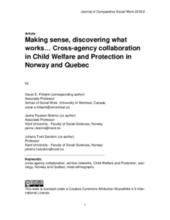This study seeks to understand collaboration dynamics in social services for determining what strategies work best in facilitating collaborative endeavors in specific policy and institutional environments. In Norway, data was collected through semi structured interviews with young adults, as well as through interviews with services workers from CWP and the Norwegian Labour and Welfare Administration. The project investigated what happens in the Norwegian welfare bureaucracy when young people turn 18. In Quebec, an analysis was conducted by relying on collaborative initiatives investigated by the Quebec observatory of local service networks.
Regarding Norway, this study finds that despite collaboration, Norwegian CWP remains a fairly closed and self-reliant sector. Norway has an organizational issue when it comes to a separation between child and adult services, which causes a complete change of care regime when children turn 18. Adult welfare services would likely find CWP collaboration advantageous to minimize later problems.
In Quebec, the concepts of ‘partnering’ and ‘cross-sector action’ have regularly been mobilized to characterize public-private relations and the sharing of service responsibilities. It was found that all networks developed various managing mechanisms and governance mechanisms evolved over time.
In Norway, an agreement on compliance with basic parameters and the ‘rules of the game’ were vital to networks’ smooth operation. Power-related variables (i.e. resources, prestige, and expertise) also prove to be central to networking.
Overall, the study found several emerging themes. These themes be important components of collaboration. Mutuality and trust emerged as critical and vital ingredients for successful collaboration in both Quebec and Norway. Another aspect of mutuality that emerged from the analysis of networking initiatives was that partners were bound together not always (or only) through a sense of shared values and preferences but through complementary differences. Virtually no specific provisions were made to sustain service networks – financially and otherwise – thereby creating significant barriers to their setting up and sustainability over time.

